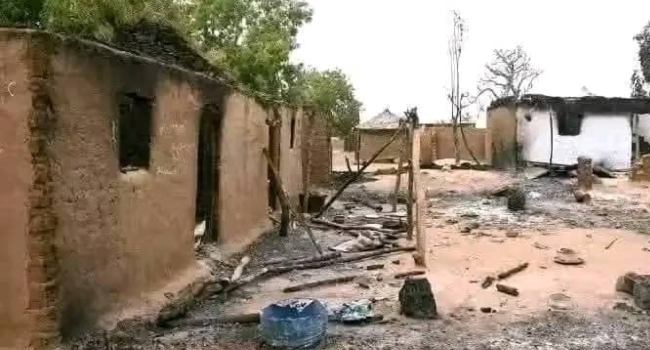LOCAL

BENUE KILLINGS: ATTACKERS ARE FOREIGNERS, SPOKE AN UNFAMILIAR LANGUAGE – ALIA
Governor Hyacinth Alia of Benue State has asserted that those responsible for the recent surge in killings across the state are not Nigerians, noting that they speak unknown languages and display foreign traits.
Governor Hyacinth Alia made these remarks on Tuesday during an appearance on Politics Today, a current affairs program on Channels Television, in response to the recent attacks in the North-Central state that have claimed numerous lives and displaced many residents.
When questioned about the identity of the assailants targeting communities in Benue, the governor emphasized the need to first understand the nature of the threat.
“Let’s be clear about the narrative. We can recognize Nigerians by their ethnic backgrounds—a Fulani man, a Yoruba man, a Hausa man—we know them,” Alia said. “Even the traditional herders are familiar to us; they herd cattle with sticks.”
“But these individuals [the attackers] arrive heavily armed with AK-47s and AK-49s. They don’t look like Nigerians. They don’t speak like us. Even the Hausa they speak is a different variant,” he added.
According to the governor, local intelligence indicates that the attackers may be foreign nationals.
“It’s not the typical Hausa spoken by Nigerians, and the Fulani they speak also differs. There’s a distinct pattern in their language, and some of our people who understand it have identified it,” he explained. “They say these individuals are Malians and clearly different from our own people. But one thing is certain—they are not Nigerians. Believe it,” he added.
Governor Alia explained that this marked a new and more dangerous phase of violence compared to previous confrontations with traditional herders.
“This is the second phase we’re witnessing. The earlier incidents involved traditional herders, and we had relatively fewer issues with them,” the governor stated. “What we’re now facing is something new, different, and unfamiliar—and it’s becoming increasingly alarming.”
“These terrorists are all over the place. We are under siege,” he added. “They strike, kill, and then retreat. The question is—where are they retreating to?”
Coordinated Attacks
He further revealed that the attacks appear highly coordinated and strategically executed.
“The manner in which these attacks are being executed clearly shows a high level of coordination,” the governor observed. “Some local government areas in Benue share borders with Cameroon, and these borders are largely porous.”
Governor Alia further revealed that intelligence reports have identified terrorist hideouts in parts of Taraba and Nasarawa states, as well as in border regions within Cameroon.
“These terrorists have established safe havens in Taraba, Nasarawa, and along the Cameroonian border,” he stated.
His comments come amid escalating concern over a surge in attacks across Benue and Plateau States, which have resulted in numerous deaths, widespread displacement, and an increasingly dire security situation in Nigeria’s Middle Belt.
Similar Concern
Two weeks ago, during an appearance on the same programme, Politics Today, Plateau State Governor Caleb Muftwang also voiced renewed concerns about the identities of those responsible for ongoing killings in the state. He revealed that many attackers do not speak any recognised Nigerian language, raising serious questions about their origin and motives.
Governor Muftwang pointed to the growing pattern of cross-border banditry across Nigeria’s north-central region.
“From what victims have reported, some of these attackers cannot speak any Nigerian language—that’s the reality,” he said. “While some are clearly not Nigerians, others are believed to have migrated from the northwest into areas like Bauchi and Plateau.”
While acknowledging that some local residents may occasionally be involved in violent acts, Muftwang stressed that the current crisis suggests a broader, more organised threat.
“I don’t want to be misunderstood as promoting ethnic profiling,” he clarified. “Here in Plateau, we uphold fairness, justice, and inclusiveness. We recognise everyone’s right to move freely within Nigeria, but it’s important to acknowledge that the majority of herders speak languages familiar to Nigerians.
“Yes, occasionally you might find an Angas, Mwaghavul, or Berom individual engaged in criminal activity—because they are human too. And when that happens, we deal with them without hesitation. But what we are facing now is a national crisis spreading into the north-central region, and it demands urgent attention.”
Lingering Attacks and Calls for Action
The governor also revealed that more than 60 communities in Plateau have been overrun by the attackers, calling for urgent federal intervention to halt what he described as a systematic campaign of land-grabbing and bloodshed.
Benue State is facing a similarly dire situation. Over the weekend, suspected herders carried out deadly attacks in Ukum and Logo LGAs, leaving at least 56 people dead. The death toll has now risen to 72.
In response, Governor Alia has appealed to President Bola Tinubu’s administration to take swift and decisive steps to restore peace and ensure the safety of residents. Meanwhile, in Plateau, Christian groups under the Church Denominational Leaders Forum and CAN organized a peace walk on Monday to protest the unending violence.
President Tinubu, in his Easter message, condemned the attacks and vowed that “forces of evil will never prevail,” while ordering security agencies to take firm action. However, former Vice President Atiku Abubakar and Peter Obi criticized the government’s handling of the situation, calling for more compassionate, community-led solutions.
The Inspector-General of Police has since ordered intensified patrols and heightened security around public areas during the Easter season.
The latest wave of violence—including the April 2025 massacres in Bokkos and Bassa that claimed over 100 lives—marks some of the worst bloodshed since the Christmas Eve 2023 attacks in Plateau, where nearly 150 people were killed in a single night.
"This represents a significant development in our ongoing coverage of current events."— Editorial Board









